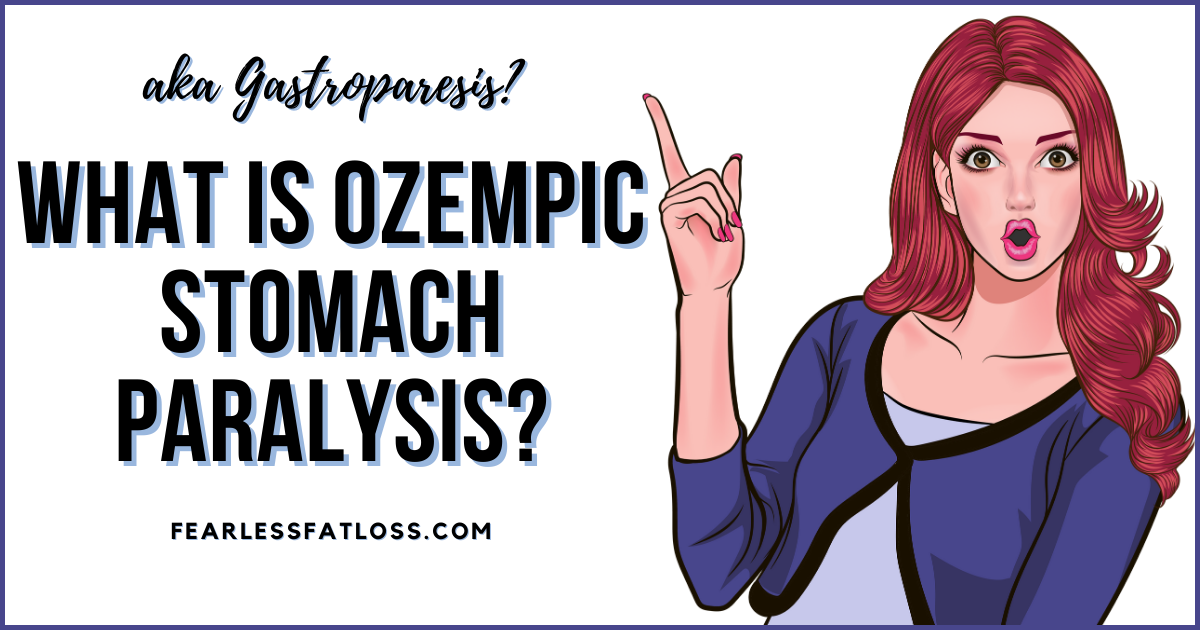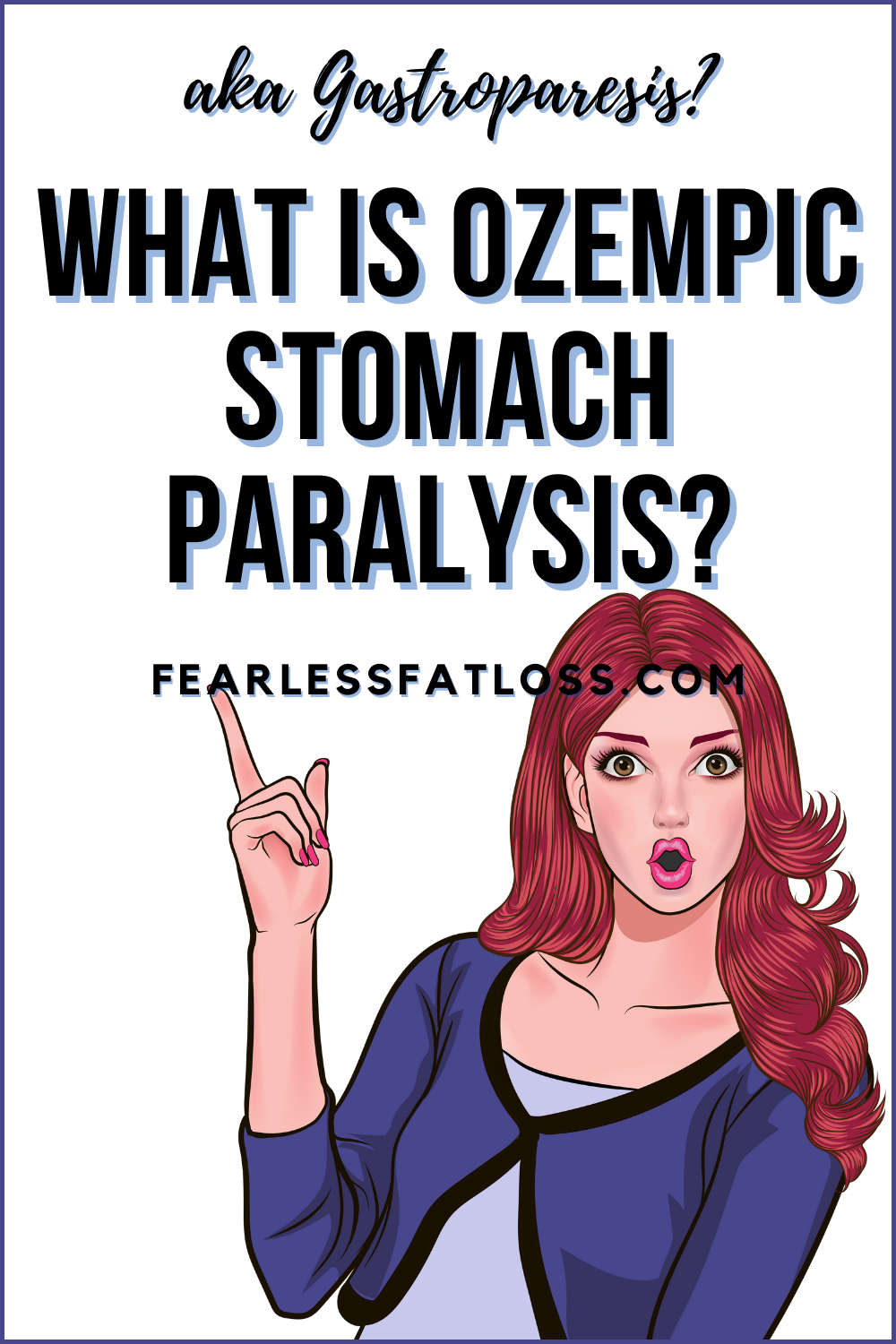What Is Ozempic Stomach Paralysis aka Gastroparesis?
Whoa, have you heard about the Ozempic stomach paralysis topic? It’s also known as Gastroparesis, aka Frozen Stomach (eek!!). I cannot “stomach this” (pun intended) and honestly, just thinking about having my digestive process messed with artificially only for the sake of weight loss simply grosses me out.
But hey, this is my opinion and there are many who are not bothered by the thought of injecting themselves each week to artificially mess with their body’s digestive process only for weight loss and will do anything to lose weight no matter the potential health risks and unknown complications down the road, unknown because…. where is the long term study on this stuff using it only for weight loss?
After all, it’s supposed to be medication for those who have the medical condition of type 2 diabetes. Those who are using it only for weight loss are not using it for a medical condition of type 2 diabetes.
Also on the topic of long term possible health issues…. do you remember Fen-Phen? That was really popular too, until it wasn’t. It was a weight loss drug popular in the 90’s until the heart and lung damage issues were discovered. There are still Fen-Phen lawsuits being filed after all that time.
The problem is the real-life health ramifications aren’t clear until after time has passed. But let’s focus here on the topic of Ozempic stomach paralysis, which is interesting, even though I find it disturbing. It’s still good to be informed.
Disclaimer: I should tell you that I’ve been anti-drug since I was a child. The only drugs I’ve done in my life are sugar (yes, sugar is a drug), caffeine, and alcohol (liquid sugar). Also I’ve taken antihistamines when I was stung by bees and naproxen sodium for a rare headache.
I’m all about natural weight loss by healing the root of the problem, rather than causing more problems with band aid short cuts which usually end up causing even more problems that what were there to begin with.
With that being said, let’s dive into this topic of stomach paralysis from Ozempic used as a weight loss drug.
What Is Ozempic Stomach Paralysis aka Gastroparesis?
Gastroparesis, commonly referred to as “stomach paralysis,” is a condition in which the stomach empties food into the small intestine at a significantly slower pace than normal. It can cause symptoms such as nausea, vomiting, abdominal pain, bloating, and malnutrition.
Recently, gastroparesis has been linked to GLP1 receptor agonists like Ozempic, a medication widely prescribed for type 2 diabetes initially, and more recently for weight loss alone.
To be clear, these drugs were supposed to be prescribed to help those with type 2 diabetes but they are being manufactured 24 hours a day in Denmark to sell in the USA as weight loss drugs.
EXACTLY HOW Does Ozempic Slow Digestion?
While doing my research to write this article, I most wanted to know HOW Ozempic slows down your digestion, which can lead to the Ozempic stomach paralysis aka Gastroparesis. Interestingly enough, this process was the hardest information for me to find, but I did find how it works.
Let’s break it all down to go through exactly HOW Ozempic slows digestion:
- Ozempic is a brand name.
- The active ingredient in Ozempic is semaglutide.
- Semaglutide is an antidiabetic medication used for the treatment of type 2 diabetes.
- Semaglutide belongs to the class of medications called glucagon-like peptide-1 (GLP-1) receptor agonists.
- An agonist is a chemical
- Semaglutide is a GLP-1 agonist.
- GLP-1 is a naturally occurring human hormone in the human body.
- Semaglutide mimics the actions of the naturally-occurring GLP-1 hormone. (NOTE: THIS Right here is what I was trying to find and understand, and I finally found it: it’s an artificial way to manipulate the naturally occurring wonderful process of human digestion. IOW it’s FAKE, not natural.)
- The human body naturally releases the hormone GLP-1 when you eat food, GLP-1 is released from the gut and intestines and it tells you that your stomach is full.
- When you inject Ozempic into your body the Semaglutide GLP-1 increases your insulin production artificially, giving you a false sense of fullness even though you haven’t eaten.
I Understand How Hard Change Can Be
Listen, I understand how hard it can be to change your habits, change your eating, let go of food addiction (yes, highly processed food is very addictive), let go of eating for comfort, to cope, as a crutch, to keep you “safe”, as your “happy pill”, as a way to “get through”, as your best friend and lover in life…. I understand how hard it can be to heal emotional eating, binge eating, and compulsive overeating, but if you go about it from the inside out it is totally possible to heal these problems.
If you take the route of healing your eating without using weight loss drugs, then you can succeed long term, naturally, with alignment. But using drugs for weight loss… how do you ever end up solving the real problems that drove your overeating, overweight, and/or obesity in the first place? Does this make sense?
Additionally, the human body is wise, the human body knows what to do, but you have to get out of your own way and get off of the addictive processed foods to break free of the struggle. Mindset is 92.8% of what will determine how successful you will be with this. This is why I focus on mindset work with my weight loss coaching clients, which is the work I’ve been doing successfully since 2009.
With that being said, let’s get back to the topic at hand and look further at Ozempic and stomach paralysis.
The Ozempic Freeze
What can happen by artificially slowing your digestion with Semaglutide Ozempic is that the body can revolt in response to the artificial processes imposed upon it with the weight loss drug and this can lead to the Ozempic Freeze, or in other words, the stomach paralysis.
If your stomach and digestive system freezes up from using Ozempic, based on what I’ve read it sounds like this can be quite painful.
Constipation is another side effect as well. Nausea, diarrhea, vomiting, constipation… this sounds like “all kind of messed up” in there (oof!)! I just don’t see how it’s worth it, especially when a core mindset shift makes it easy to change your eating habits and get the weight off for good….
But back to the topic of The Ozempic Freeze Up…
Ozempic works by slowing gastric emptying and suppressing appetite, making it helpful for weight loss if your only problem standing in the way of losing weight is physical hunger. This right here presents a problem though, since the majority of the overweight and obese struggle with emotional eating, binge eating, compulsive overeating, and mindless eating.
These eating behaviors are not driven by physical hunger.
“I wish I never touched it. I wish I’d never heard of it in my life,” said Knight, 37, of Angie, Louisiana. “This medicine made my life hell. So much hell. It has cost me money. It cost me a lot of stress; it cost me days and nights and trips with my family. It’s cost me a lot, and it’s not worth it. The price is too high.”
The topic of Ozempic slowing your stomach from emptying however, for some users, can lead to gastroparesis, aka stomach paralysis (oh my gosh, how painful is that??). Research indicates that women using Ozempic for weight loss have a 66% higher risk of developing gastroparesis compared to nonusers, with 10 out of 10,000 users diagnosed at least six months into using it.
While most cases improve after stopping the drug, some patients report prolonged symptoms, raising concerns about long term side effects.
Clinical studies suggest this condition is underdiagnosed, as traditional diagnostic methods often miss its presence.
Emily Wright, 38, a teacher in Toronto, started taking Ozempic in 2018. Over a year, she said, she lost 80 pounds, which she’s been able to keep off. But Wright said she now vomits so frequently that she had to take a leave of absence from her job.
“I’ve almost been off Ozempic for a year, but I’m still not back to my normal,” Wright said.
Risks and Management of Ozempic Linked Gastroparesis
Let’s take a look at a few more risks of using Ozempic for weight loss, along with a few ways to manage the risks if you’re committed to using this weight loss drug.
Risks:
Besides gastroparesis, Ozempic users are at increased risk for nausea, vomiting, and gastrointestinal distress. These symptoms can significantly affect quality of life and overall health, particularly in individuals prone to eating disorders.
Possible Management Strategies for nausea, vomiting, and gastrointestinal distress:
1. Medical adjustments: Dosage changes or alternative medications.
2. Dietary modifications: Eating smaller, more frequent meals; avoiding high fat and high fiber foods.
3. Lifestyle changes: Regular, gentle exercise and stress reduction.
4. Medical interventions: In severe cases, nutritional support or motility enhancing medications.
Management Strategies for overeating eating disorders:
1. Heal the root of what is driving your out-of-control overeating, whether limiting beliefs, food stories, self-esteem, self-worth, negative self-talk, etc. These problems are often unconscious.
2. If you would prefer talk therapy to work through these issues, seek out therapy related specifically to eating and food challenges. If you struggle often with unconscious eating perhaps speaking about it can help.
3. If your goal is to make changes in your eating behaviors as quickly as possible, this is what coaching is focused on: making changes to get results quickly. Note that coaching is not therapy, coaching is about results.
4. If you struggle with the eating disorder anorexia or the eating disorder bulimia, you might need an in-patient treatment program as these are serious behaviors that need extra help to work through and heal.
The decision to continue using Ozempic to lose weight involves weighing these risks against its benefits, while keeping in mind that if it works for you, it’s the kind of thing you will have to continue using the rest of your life because if you stop, guess what will happen?
You guessed it: if Ozempic works for you to take away your overeating then as soon as you stop injecting yourself with it.
The Natural Path to Weight Loss
Unlike weight loss drugs, natural methods of achieving a healthy weight focus on whole body wellness. A balanced lifestyle, including whole foods, eating clean and regular exercise, yields sustainable results without the unpleasant side effects like nausea, vomiting, or diarrhea. Moreover, these approaches often empower smart, savvy women to maintain their weight without ongoing medical intervention.
I wish to point out a glaring point which I don’t see anyone else talking about, even for those with type 2 diabetes: This Ozempic drug came about initially to regulate blood sugar levels.
Well guess what?! You can do this by changing your eating behaviors, getting off of processed foods, switching to whole foods, using portion control, eating small meals and snacks every 2.5 to 3 hours, and over time it is absolutely possible to even reverse type 2 diabetes.
What most are doing by taking Ozempic is they are relying on the drug to regulate their blood sugar without making any changes at all to their eating behaviors. In fact I know someone personally who takes medication for diabetes (not Ozempic) and eats cake at least twice a day, lots of cake, and making no effort at all to change eating behaviors.
The Magical Fix Mindset
This is very common, and I understand how easy it is to fall into the trap of the “magical fix mindset”. I’ve been under the spell of this mindset before too, finding a new diet in the past that I would think was “the magic bullet” for all that ailed me, but you know what always ends up happening?
Over time experience shows that there is no magical fix for food and weight problems, the only real and true solution ends up being a lifestyle shift but to make it work and make it last, it needs to be a whole mind-body solution.
A critical but overlooked aspect of weight loss is mindset. Did you know that mindset accounts for 92.8% of successful, lasting weight loss? A transformational mindset shift enables you to move away from emotional eating, mindless eating, comfort eating and binge eating and into a “struggle-free zone” where healthy choices feel effortless. However, this transformation requires proven strategies that go beyond mainstream dieting advice.
Why Ozempic Falls Short for Emotional Eating
Drugs like Ozempic fail to address the root cause of behaviors like emotional eating, binge eating, and compulsive overeating. These patterns are not driven by physical hunger but by emotional triggers, stress, and ingrained habits, which are often unconscious, making them harder to overcome alone.
Ozempic suppresses appetite, but it cannot resolve the underlying issues that fuel an unhealthy relationship with food. Addressing and healing your relationship with food is a critical step in moving beyond behaviors such as emotional eating.
What happens when you stop taking Ozempic? Appetite and cravings return and often return even stronger than they were before, along with the potential for fast weight regain. This means that if you don’t address the root of your overeating, you’ll need to continue Ozempic for life to try to keep a lid on a lifetime of habits and impulses.
Are you prepared to take injections for life, or is it time to explore a solution that heals from within?
Who Else Wants Freedom Without Relying on Weight Loss Drugs?
What if you could break free of overeating and lose weight for good without relying on weight loss drugs?
How easy would it be to lose weight if you could stop binge eating, stop emotional eating, and quit yo-yo dieting?
I know it can feel daunting after a lifetime of struggling with food and your weight but if you go about it in a different way than you have before, it really is possible to break free and lose weight for good. You have to get into the right frame of mind though.
Mindset is 92.8% of the challenge. Your mindset about change, about weight loss, about successfully shifting in a way you haven’t before… your mindset about all of this is what will determine how successful you will be.
This is the work that I’ve been doing with coaching clients since 2009. If you want to change, you can, and it works even if you don’t feel fully confident in yourself right now. You just have to follow the steps, a step at a time, to heal your inner self, to change your mind to change your body.
If you’re ready to heal the root causes of your eating and weight struggles, consider a new approach. Start with your first step: apply for a complimentary weight loss discovery session to uncover how you can release emotional eating, binge eating, and yo-yo dieting. Together, we’ll create a personalized path to freedom, so weight loss becomes “no big deal” and your healthiest self emerges naturally.
Your journey to a healthier, more empowered you can begin today, if you want it to!






I was on Ozempic for 6 weeks. I was constantly nauseated and vomiting.
I lost 15 pounds. Could not tolerate medication. After stopping it gained 10 pounds back in 2 weeks.